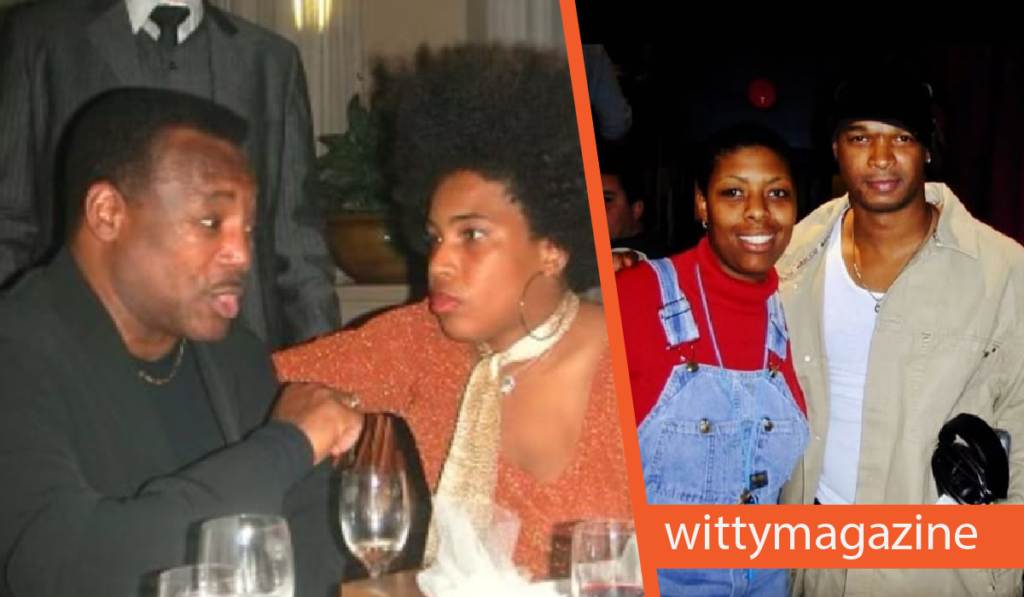Tracey Hinds is often introduced to the public as the former husband of Grammy-winning singer Macy Gray, yet the fuller picture reveals a grounded American professional whose life blended quiet influence, consistent work ethic, and devoted fatherhood; understanding his story means seeing a man who navigated the changing tides of the 1990s mortgage industry, balanced the intense demands of early family life with long hours and client responsibilities, and maintained his dignity beyond the spotlight, and in this comprehensive article you’ll find a clear, reader-friendly exploration of his background, character, career journey, marriage and co-parenting years, the pressures that led to divorce, his return to privacy, his later years and passing in 2021, the financial legacy he built through steady practice, the ways his presence influenced Macy Gray’s creative evolution, and the enduring lessons his life offers about resilience, responsibility, and the kind of success that doesn’t require headlines to be meaningful.
Details Summary: Tracey Hinds
| Category | Details |
|---|---|
| Full Name | Tracey Hinds |
| Famous As | Ex-Husband of Singer Macy Gray |
| Profession | Mortgage Broker / Entrepreneur |
| Date of Birth | 1960s |
| Place of Birth | United States of America |
| Date of Death | 2021 |
| Age at Death | In His 50s |
| Nationality | American |
| Ethnicity | African American |
| Religion | Christianity |
| Marital Status | Divorced |
| Ex-Wife | Macy Gray (Singer, Songwriter, Actress) |
| Children | Aanisah Hinds, Tahmel Hinds, Happy Hinds |
| Height | 5’10” (178 cm) |
| Weight | 80 kg (176 lbs) |
| Hair Color | Black |
| Eye Color | Dark Brown |
| Net Worth | Approximately $1.1 Million |
| Known For | Early Influence on Macy Gray’s Life and Career |
| Personality Traits | Private, Grounded, Responsible, Supportive |
| Legacy | Remembered for His Integrity, Fatherhood, and Professional Success |
Early Life and Background
Growing up in the United States in the 1960s, Tracey Hinds came of age during a period of major social and economic transformation that demanded adaptability and perseverance from Black professionals, and although public records offer few details about his parents, siblings, or schooling—consistent with a lifelong preference for privacy—the contours of his adult career suggest exposure to environments that rewarded numeracy, client service, and discretion; while specific institutions and degrees are not widely documented, it is reasonable to situate his education near finance, business, or related fields that feed naturally into mortgage brokerage, and this context matters because entering the loan market in the 1990s required comfort with regulation, risk assessment, and the interpersonal finesse to translate complex financial products into clear paths toward homeownership for ordinary families.
Physical Appearance and Personality
Descriptions of Tracey Hinds emphasize a trim, professional build at roughly 5’10” and 80 kg with black hair and dark brown eyes, but it is the connection between appearance and temperament that rounds out his public image: colleagues and acquaintances recall a calm, measured personality that communicated confidence without the need for showmanship, the quiet type who arrives prepared, listens more than he speaks, and treats client anxieties about interest rates, down payments, and underwriting criteria as problems to be solved rather than points for persuasion, and this low-key presence—paired with an instinct for privacy—allowed him to move through the world of celebrity adjacency without being captured by it, protecting his family’s boundaries while focusing on work that paid the bills and built long-term stability.
Professional Career: A Life in the Mortgage Industry (The Beginnings)
When Tracey Hinds entered mortgage and finance in the 1990s, the industry was evolving rapidly with new loan products, changing secondary markets, and technology creeping into underwriting and origination workflows, and his early experiences would have involved learning how to evaluate borrower profiles, verify income and credit, interpret appraisals, explain amortization schedules, and match clients to lenders whose guidelines fit each case, which in practice meant mastering both the math and the human side—turning complex, sometimes intimidating steps into a clear, step-by-step process for families who saw homeownership as a milestone worth fighting for, a balance of rigor and empathy that became a hallmark of his professional identity.
More From Info: Who Is Amber Lynn Curry? The Tragic Story of The D.O.C.’s Daughter
Professional Career: Building a Reputation in Finance
As Tracey Hinds established himself, his value proposition crystallized around three pillars—clear communication, ethical deal-making, and reliable execution—because a good mortgage broker does far more than broker: he triangulates between borrower needs and lender criteria, anticipates documentation hurdles, calibrates expectations on rates and terms, and shepherds files from pre-approval through closing without costly surprises, and by earning trust through punctual updates, realistic timelines, and honest appraisals of what’s possible, he developed the durable client relationships that power referral-based practices, proving that professional success can be quietly compounding when grounded in competence and care rather than self-promotion.
Professional Career: Impact and Achievements
Over time, Tracey Hinds became known for reliability and ethics in an industry that rewards speed yet punishes carelessness, and his impact shows in outcomes more than accolades—families closing on first homes, clients refinancing at opportune moments, and borrowers with non-standard profiles finding responsible products that fit their realities—while any entrepreneurial ventures or leadership roles he assumed would have likely reflected the same low-drama, systems-focused approach; importantly, even as his personal life intersected with fame through marriage, he maintained professional boundaries and kept clients’ needs at the center, demonstrating that discretion and duty are compatible with growth in a field where reputation is currency.
Love Story and Marriage to Macy Gray (How They Met)
In the early 1990s, before Macy Gray’s global breakthrough and while she was still shaping her stage identity beyond her given name Natalie McIntyre, Tracey Hinds and Macy crossed paths and found a complementary chemistry—his steadiness balancing her artistic experimentation—and that balance mattered because it gave structure to the uncertainty of early creative life, with Tracey’s practical mindset creating an anchor at home while Macy followed a path that required risk-taking, late nights, and resilience in the face of rejection, and together they built a young household whose currency was ambition and mutual belief.
Love Story and Marriage to Macy Gray (Timeline and Early Years)
Married in 1996, Tracey Hinds and Macy Gray entered a stretch defined by shared responsibility and accelerated growth, and while their union ended in 1998, those formative years coincided with the period just before Macy’s 1999 album On How Life Is reshaped her public trajectory, making their household a crucible where work schedules, bills, studio sessions, and child-rearing demands collided; importantly, the partnership functioned not as a backdrop but as an incubator of lessons—about compromise, perseverance, and the emotional costs of big dreams—that would echo in the art the world later heard.

Love Story and Marriage to Macy Gray (Shared Dreams and Early Struggles)
For Tracey Hinds and Macy Gray, the early marriage years were defined by tandem growth under pressure: they carried family responsibilities while nurturing parallel aspirations, and Tracey’s insistence on stability—managing finances, planning for contingencies, and keeping the home front organized—allowed Macy to keep experimenting with voice, writing, and performance without losing direction, and this interplay between order and creativity not only deepened their bond but also fed the emotional register that listeners later recognized in songs about hope, regret, longing, and resolve.
Parenthood and Family Life
Parenthood sharpened the contours of responsibility for Tracey Hinds, whose three children with Macy Gray—Aanisah, Tahmel, and Happy—became a central axis for his decisions, and while Macy’s path demanded public work and travel, Tracey’s role blended provider, planner, and calm center of gravity, passing along values of craft and independence that appear in the children’s trajectories: Aanisah channeling creativity into visual design and brand work, Tahmel forging his own path in music with a distinct identity, and Happy building editorial and media platforms, and taken together their pursuits reflect a home culture where art and execution weren’t opposites but partners in making meaningful work.
Challenges and Divorce
By 1998, the strain of divergent paths—Macy Gray rising toward a demanding public career and Tracey Hinds safeguarding a stable, private life—led to separation, a turning point that they navigated with respect and a commitment to co-parenting, and while the decision to part carried pain, it also catalyzed reflection that found its way into Macy’s breakthrough period around 1999; for Tracey, the divorce clarified priorities: protect the children’s routines, focus on clients and cash flow, and keep private matters private, a stance that preserved dignity and allowed both parties to move forward without turning personal history into public spectacle.
Life After Divorce
After the split, Tracey Hinds returned decisively to the background, declining the media’s implicit invitation to become a character in someone else’s narrative and instead doubling down on the steady cadence of work calls, file pipelines, and family logistics, and this choice—eschewing visibility—was not retreat but principle, an affirmation that meaningful contribution can be quiet, and that long-term well-being often depends on boundaries; as Macy’s fame expanded, Tracey’s unwavering privacy and reliability provided a counterweight, a quiet strength that helped keep the family environment predictable for growing children.
Later Years and Death (2021)
In his later years, Tracey Hinds sustained the same habits that defined him—methodical work, guarded public footprint, and devotion to his children—and in 2021 he passed away in his 50s, with loved ones marking the loss in personal tributes that emphasized character over notoriety; his departure closed a chapter of practical wisdom and understated courage, reminding observers that the measure of a life is often felt most directly by those who shared dinners, budgets, school runs, and private conversations—moments that never trend but shape futures all the same.
Net Worth and Financial Legacy
An estimated $1.1 million net worth at the time of his passing places Tracey Hinds among professionals who, through consistency rather than spectacle, accumulate stability that outlasts careers, and understanding this figure requires recognizing the economics of brokerage: revenue tied to volume, margins influenced by rate cycles, and resilience built by compliance discipline and repeat clients; compared with Macy Gray’s entertainment earnings, Tracey’s finances reflect independence rather than dependency, a testament to prudent planning, controlled lifestyle inflation, and the compounding power of staying the course across market swings.
Influence on Macy Gray’s Success
The influence of Tracey Hinds on Macy Gray’s creative arc is best understood as emotional scaffolding rather than artistic authorship—by providing grounding during years when identity and career were still molten, he helped create conditions in which honest songs could emerge, and the relationship’s rise, friction, and resolution offered narrative fuel for themes of love, loss, responsibility, and self-belief that listeners heard in Macy’s voice; while he never sought a stage, his presence—steady, human, imperfect—became part of the emotional palette that colored the work which later reached millions.

Legacy Beyond Fame
Stripped of headlines and credits, the legacy of Tracey Hinds resolves into virtues that scale in families and communities: keep your word, do the work, protect your privacy, honor your children, and let results speak, and you see that legacy in adult children who build creative practices without needing permission, in clients who remember a broker who returned calls and told the truth about what they could afford, and in an ex-spouse who could pursue destiny knowing the home front had a backbone, proof that ordinary strength, applied daily, is extraordinary in effect.
Lesser-Known Facts
Among the quieter notes about Tracey Hinds are his inclination to offer practical guidance to younger colleagues navigating their first file stacks, his deliberate refusal to leverage celebrity adjacency for business advantage, and affinities—like sports, jazz, or community touchpoints—that fit a personality more attuned to real life than red carpets; if he held a motto, it read in his choices: family first, hard work always, privacy protects peace, a triad that aged well and explains the steadiness people recall when they speak his name.
Conclusion
Remembering Tracey Hinds means honoring a dual legacy of professional excellence and emotional influence, a life that proved how guidance, structure, and financial stewardship can underwrite someone else’s leap into the extraordinary while also building a durable, dignified path for oneself; his story underscores that impact does not require applause, that devotion can be measured in schedules kept and futures secured, and that the soulful notes we celebrate in public often arise from private chapters where someone like Tracey chose reliability over recognition and substance over spectacle.
FAQs
1. Who was Tracey Hinds?
Tracey Hinds was an American mortgage broker and entrepreneur best known as the former husband of R&B and soul singer Macy Gray. Beyond his association with fame, he built a respected career in real estate finance, helping individuals and families achieve homeownership while maintaining a private, low-profile lifestyle.
2. When were Tracey Hinds and Macy Gray married?
Tracey Hinds and Macy Gray were married in 1996, during the early stages of Macy’s career, and divorced in 1998. Although their marriage was short-lived, it played a meaningful role in Macy Gray’s personal and artistic growth, influencing the emotional depth heard in her later music.
3. How many children did Tracey Hinds have?
Tracey Hinds had three children with Macy Gray — Aanisah, Tahmel, and Happy Hinds. Each has followed a creative path: Aanisah works as a graphic designer, Tahmel is a musician, and Happy is the founder and editor-in-chief of Happy Hinds Magazine.
4. What was Tracey Hinds’ profession and net worth?
Tracey Hinds worked as a mortgage broker in the United States, where he earned a reputation for professionalism and integrity. Through decades of consistent work in the finance industry, he accumulated an estimated net worth of around $1.1 million by the time of his passing in 2021.
5. When did Tracey Hinds pass away, and how is he remembered today?
Tracey Hinds passed away in 2021 at age 50-something. He is remembered for his steady character, devotion to his family, and contributions to his profession. His quiet strength, discipline, and integrity continue to define his legacy beyond the public spotlight.


